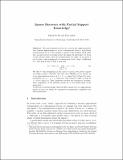| dc.contributor.author | Do Ba, Khanh | |
| dc.contributor.author | Indyk, Piotr | |
| dc.date.accessioned | 2012-10-12T18:12:50Z | |
| dc.date.available | 2012-10-12T18:12:50Z | |
| dc.date.issued | 2011-08 | |
| dc.date.submitted | 2011-08 | |
| dc.identifier.isbn | 978-3-642-22934-3 | |
| dc.identifier.uri | http://hdl.handle.net/1721.1/73940 | |
| dc.description | 14th International Workshop, APPROX 2011, and 15th International Workshop, RANDOM 2011, Princeton, NJ, USA, August 17-19, 2011. Proceedings | en_US |
| dc.description.abstract | The goal of sparse recovery is to recover the (approximately) best k-sparse approximation [ˆ over x] of an n-dimensional vector x from linear measurements Ax of x. We consider a variant of the problem which takes into account partial knowledge about the signal. In particular, we focus on the scenario where, after the measurements are taken, we are given a set S of size s that is supposed to contain most of the “large” coefficients of x. The goal is then to find [ˆ over x] such that [ ||x-[ˆ over x]|| [subscript p] ≤ C min ||x-x'||[subscript q]. [over] k-sparse x' [over] supp (x') [c over _] S]
We refer to this formulation as the sparse recovery with partial support knowledge problem ( SRPSK ). We show that SRPSK can be solved, up to an approximation factor of C = 1 + ε, using O( (k/ε) log(s/k)) measurements, for p = q = 2. Moreover, this bound is tight as long as s = O(εn / log(n/ε)). This completely resolves the asymptotic measurement complexity of the problem except for a very small range of the parameter s.
To the best of our knowledge, this is the first variant of (1 + ε)-approximate sparse recovery for which the asymptotic measurement complexity has been determined. | en_US |
| dc.description.sponsorship | Space and Naval Warfare Systems Center San Diego (U.S.) (Contract N66001-11-C-4092) | en_US |
| dc.description.sponsorship | David & Lucile Packard Foundation (Fellowship) | en_US |
| dc.description.sponsorship | Center for Massive Data Algorithmics (MADALGO) | en_US |
| dc.description.sponsorship | National Science Foundation (U.S.) (Grant CCF-0728645) | en_US |
| dc.description.sponsorship | National Science Foundation (U.S.) (Grant CCF-1065125) | en_US |
| dc.language.iso | en_US | |
| dc.publisher | Springer Berlin / Heidelberg | en_US |
| dc.relation.isversionof | http://dx.doi.org/10.1007/978-3-642-22935-0_3 | en_US |
| dc.rights | Creative Commons Attribution-Noncommercial-Share Alike 3.0 | en_US |
| dc.rights.uri | http://creativecommons.org/licenses/by-nc-sa/3.0/ | en_US |
| dc.source | MIT web domain | en_US |
| dc.title | Sparse recovery with partial support knowledge | en_US |
| dc.type | Article | en_US |
| dc.identifier.citation | Ba, Khanh Do, and Piotr Indyk. “Sparse Recovery with Partial Support Knowledge.” Approximation, Randomization, and Combinatorial Optimization. Algorithms and Techniques. Ed. Leslie Ann Goldberg et al. LNCS Vol. 6845. Berlin, Heidelberg: Springer Berlin Heidelberg, 2011. 26–37. | en_US |
| dc.contributor.department | Massachusetts Institute of Technology. Department of Electrical Engineering and Computer Science | en_US |
| dc.contributor.mitauthor | Do Ba, Khanh | |
| dc.contributor.mitauthor | Indyk, Piotr | |
| dc.relation.journal | Approximation, Randomization, and Combinatorial Optimization. Algorithms and Techniques | en_US |
| dc.eprint.version | Author's final manuscript | en_US |
| dc.type.uri | http://purl.org/eprint/type/ConferencePaper | en_US |
| dspace.orderedauthors | Ba, Khanh Do; Indyk, Piotr | en |
| dc.identifier.orcid | https://orcid.org/0000-0002-7983-9524 | |
| mit.license | OPEN_ACCESS_POLICY | en_US |
| mit.metadata.status | Complete | |
